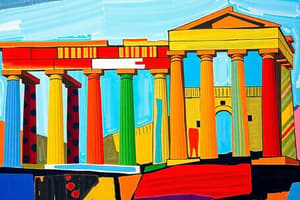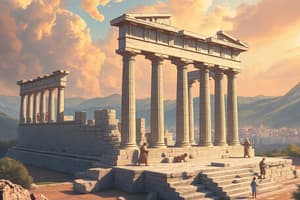Podcast
Questions and Answers
Why was maritime transportation crucial for the ancient Greeks?
Why was maritime transportation crucial for the ancient Greeks?
- It was the primary means of transporting agricultural goods due to Greece's rocky terrain. (correct)
- It was essential for military training.
- It facilitated religious ceremonies.
- It was the only method for long-distance communication.
What limitation existed in ancient Greek society regarding citizenship?
What limitation existed in ancient Greek society regarding citizenship?
- Citizenship was limited to men with military experience.
- Slaves and women were excluded from citizenship. (correct)
- Only those born in Athens could be citizens.
- Citizenship was limited to landowners.
How did Sparta's societal focus differ from that of other Greek city-states?
How did Sparta's societal focus differ from that of other Greek city-states?
- Sparta focused on democratic governance.
- Sparta emphasized philosophical pursuits.
- Sparta prioritized economic development.
- Sparta placed a strong emphasis on military training and discipline. (correct)
What specific type of religious belief system was practiced by the ancient Greeks?
What specific type of religious belief system was practiced by the ancient Greeks?
What was a primary strategic advantage provided by Greek colonies?
What was a primary strategic advantage provided by Greek colonies?
Which eastern empire posed a significant threat to the freedom and autonomy of the ancient Greek city-states?
Which eastern empire posed a significant threat to the freedom and autonomy of the ancient Greek city-states?
How did the Assembly directly impact the governance and decision-making within a Greek city-state?
How did the Assembly directly impact the governance and decision-making within a Greek city-state?
Why did Pericles advocate for paying jurors for their civic duties in Athens?
Why did Pericles advocate for paying jurors for their civic duties in Athens?
What was the primary catalyst for the formation of the Peloponnesian League?
What was the primary catalyst for the formation of the Peloponnesian League?
What was a significant factor contributing to Athens' defeat in the Peloponnesian War?
What was a significant factor contributing to Athens' defeat in the Peloponnesian War?
Which kingdom, located to the north of Greece, eventually conquered most of the Greek city-states by 336 B.C.?
Which kingdom, located to the north of Greece, eventually conquered most of the Greek city-states by 336 B.C.?
What was Aristotle's most significant contribution to Alexander the Great's development?
What was Aristotle's most significant contribution to Alexander the Great's development?
Besides trade, what other crucial purpose did boats serve for the Greeks?
Besides trade, what other crucial purpose did boats serve for the Greeks?
What was considered the most prized export of the ancient Greeks?
What was considered the most prized export of the ancient Greeks?
Which activity did Athenians devote comparatively less time to compared to other city-states like Sparta?
Which activity did Athenians devote comparatively less time to compared to other city-states like Sparta?
What was the primary function of the Acropolis in ancient Greek cities?
What was the primary function of the Acropolis in ancient Greek cities?
How does an oligarchy differ from a democracy in terms of decision-making?
How does an oligarchy differ from a democracy in terms of decision-making?
What distinguished Sparta from other Greek city-states in its response to potential internal rebellions?
What distinguished Sparta from other Greek city-states in its response to potential internal rebellions?
What kind of training did Spartan girls receive, and how did it contribute to Spartan society?
What kind of training did Spartan girls receive, and how did it contribute to Spartan society?
What role did 'reason' play in Ancient Greek society?
What role did 'reason' play in Ancient Greek society?
Flashcards
Peloponnesian War
Peloponnesian War
A war fought between Athens and Sparta during 400 B.C.
Philosophy
Philosophy
The study of truth, wisdom, and the right way to live.
Aristocrats
Aristocrats
Rich landowners in Ancient Greece.
Peninsula
Peninsula
Signup and view all the flashcards
Monarchy
Monarchy
Signup and view all the flashcards
Oligarchy
Oligarchy
Signup and view all the flashcards
Democracy
Democracy
Signup and view all the flashcards
Acropolis
Acropolis
Signup and view all the flashcards
Agora
Agora
Signup and view all the flashcards
Citizen
Citizen
Signup and view all the flashcards
Assembly
Assembly
Signup and view all the flashcards
Polis
Polis
Signup and view all the flashcards
Classical Age
Classical Age
Signup and view all the flashcards
Tyrant
Tyrant
Signup and view all the flashcards
Reason
Reason
Signup and view all the flashcards
Alliance
Alliance
Signup and view all the flashcards
Persian War
Persian War
Signup and view all the flashcards
Crete
Crete
Signup and view all the flashcards
Mount Olympus
Mount Olympus
Signup and view all the flashcards
Socrates
Socrates
Signup and view all the flashcards
Study Notes
- Peloponnesian War took place in the 400 B.C. between Athens and Sparta.
- Philosophy is the study of truth, wisdom, and the ideal way of life.
- Aristocrats were rich landowners.
- Peninsula refers to a land area almost entirely surrounded by water.
- Monarchy is a system of government ruled by a king or queen.
- Oligarchy is a form of government where a small group controls decision-making.
- Democracy is a system of government where citizens vote on governmental decisions.
- Acropolis was a large hill in Ancient Greece used for shelter and safety.
- Agora served as a meeting place and marketplace.
- Citizen is a person with rights and responsibilities in their country.
- Assembly is a lawmaking body made up of citizens.
- Polis is a city-state in Ancient Greece.
- Classical refers to an age marked by great achievements.
- Tyrant is a leader who held power through force.
- Reason is clear and ordered thinking.
- Alliance is an agreement to work together.
- The Persian War was a series of wars between Persia and Greece.
Greek Islands
- Crete is the largest of the Greek islands.
- Rhodes is an ideal rest stop for ships sailing between Greece and Western Asia.
Greek terrain and trade
- Rocky terrain made growing crops difficult in Greece.
- Boats were a common form of transportation for Greek trade.
- Olives were among the most prized Greek exports.
- Slaves and women could not be citizens in Greece.
Sparta
- By 700 B.C., Sparta was the largest Greek city-state.
- Sparta was distinct from other city-states due to its focus on military training.
- Around 600 B.C., slaves revolted against Spartan domination.
- Spartan girls trained in running and throwing javelins.
Athens
- Athenians did not spend much time on military training.
- The Greeks practiced polytheism.
- Colonies were important to the Greeks for defense and trade.
- Persia threatened Greek freedom.
- The Parthenon served as the religious center of Athens.
- The assembly voted on issues.
- Pericles wanted jurors to be paid for their services.
- The Peloponnesian League formed due to jealousy of Athens' power and wealth.
- Athens lost the Peloponnesian war due to disease.
- Macedonia conquered most of Greece by 336 B.C.
Key Figures
- Aristotle educated Alexander the Great, instilling a respect for Greek culture.
- Mount Olympus was the dwelling place of the Greek gods.
- Homer is believed to be the author of the Iliad and Odyssey.
- Socrates was a Greek philosopher sentenced to death for questioning the Athenian government.
- Alexander the Great conquered Egypt, Persia, and part of India, before passing away in 331 B.C.
- Sparta was dominated by the military.
- Attica is a wedge-shaped peninsula that juts into the Mediterranean Sea.
- Plato learned and taught Socrates’ teachings.
- Pericles wanted Athens to allow poor and rich citizens to participate in the government.
- Athens had a large Acropolis dedicated to Athena.
Studying That Suits You
Use AI to generate personalized quizzes and flashcards to suit your learning preferences.




